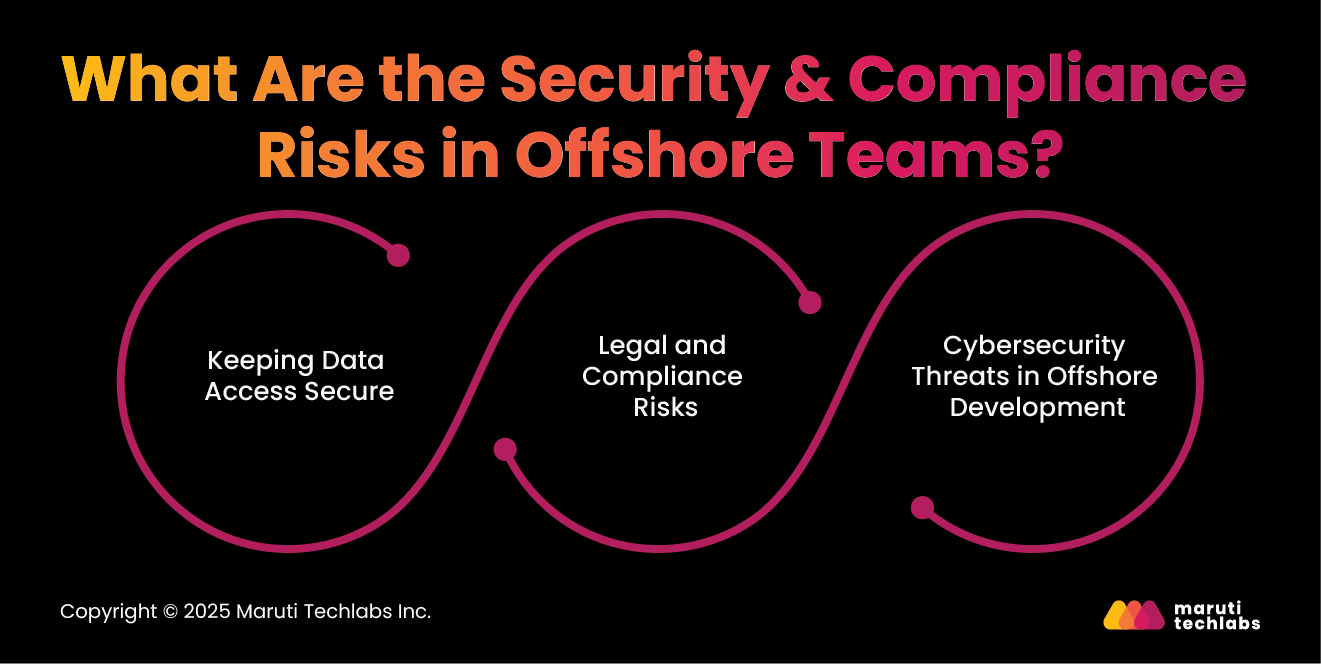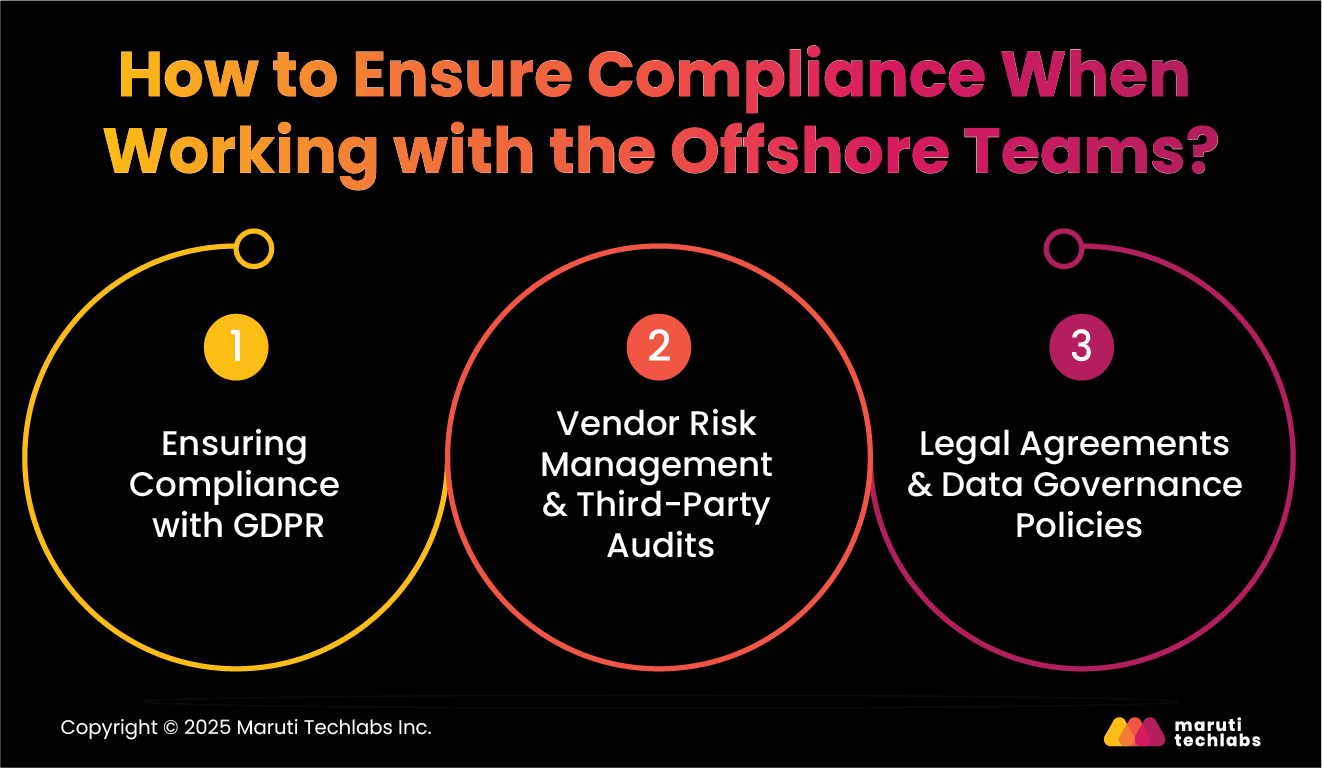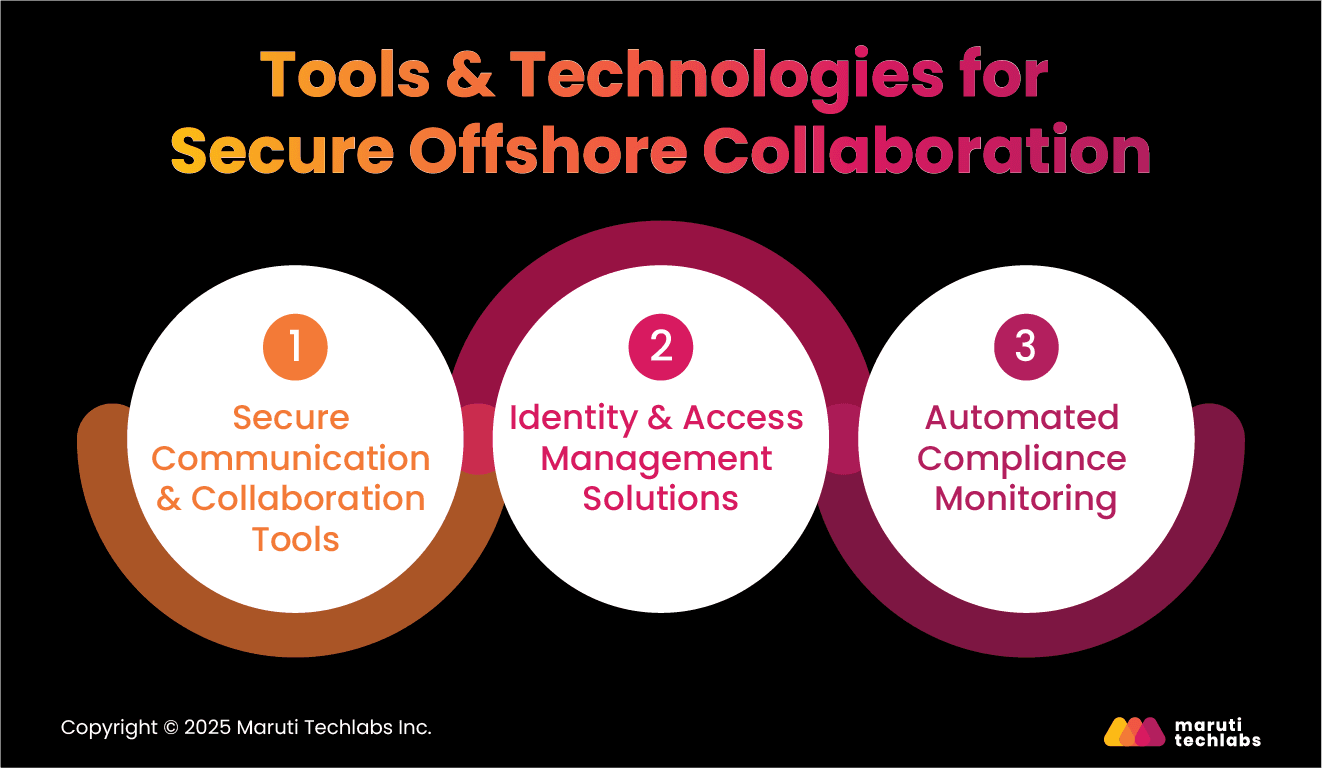

Best Practices for Data Security & Compliance in Offshore Teams






The offshore software development (OSD) market is expanding fast. It’s expected to reach $151.9 billion by 2025 and grow to $389.7 billion by 2033. More businesses are turning to offshore teams to build software faster, cut costs, and find skilled talent worldwide.
However, as more businesses turn to offshore development, keeping data secure and following compliance rules is more important than ever. Companies must ensure sensitive data remains protected while meeting industry regulations, no matter where their teams are located.
Offshore software development comes with other challenges, too, like time zone differences, communication issues, and quality maintenance. The challenge is to work smoothly while keeping data safe and following the rules. In this blog, we will explore the risks, best practices, and strategies for maintaining data security while working with offshore development teams.
Working with offshore teams has many benefits, but it also comes with security and compliance risks. Companies must take extra steps to protect sensitive data, follow legal rules, and guard against cyber threats. Let’s break down the key risks and how they impact offshore development.

One of the biggest challenges is controlling who can access company data. Offshore development teams work from different locations and time zones, making it harder to monitor data usage in real time. If access is not carefully managed, unauthorized people could see or misuse sensitive information.
Companies must also consider data protection laws like GDPR (in Europe) and HIPAA (for U.S. healthcare). If offshore teams don’t follow these regulations, businesses could face legal trouble or hefty fines.
Offshore development teams often work under different legal systems, which can create confusion about data privacy rules. For example:
Failing to comply with these rules can result in lawsuits, financial penalties, and loss of customer trust. That’s why businesses must carefully check the legal requirements before outsourcing work.
Cyber threats are a more significant concern when teams work remotely, especially with offshore development teams. Some common risks include:
To reduce these risks, businesses need to implement strong security measures, such as encryption, multi-factor authentication, and regular security checks.
By understanding these risks, companies can take the right steps to protect their data and make sure they follow the rules. This helps them build a secure and reliable offshore team.
Ensuring the security of your data when working with offshore development teams requires a strong framework of policies and practices. Here are some best practices to help you safeguard your data and build a secure working environment with your offshore teams.
One of the most effective ways to enhance security is through Role-Based Access Control (RBAC) and Zero Trust principles. RBAC ensures that only the right people have access to the right data. This means that employees can only access the data they need for their specific tasks. For example, a developer working on code won’t have access to financial records.
Zero Trust takes this even further. It assumes that no one — not even trusted employees or devices — should be automatically trusted. Every user and device must be verified before they can access any resources. This approach reduces the risk of unauthorized access.
To support this model, businesses can use multi-factor authentication (MFA) and ensure devices meet specific security standards before being allowed to connect. This strict verification process adds another layer of security and makes it harder for hackers to gain access.
Data encryption is another key practice for securing information. It ensures that even if someone gains access to the data, they won’t be able to read or use it. Encryption at rest protects stored data, like files saved on a server. Using strong encryption algorithms, such as AES-256, ensures that the data stays unreadable even if someone manages to access it.
Encryption in transit protects data as it moves between different devices or networks. Secure communication channels, like HTTPS or Secure WebSocket (WSS), should be used for online data transfer. Additionally, implementing Transport Layer Security (TLS) can help secure communications and prevent data from being intercepted during transmission.
In addition to encryption, it’s also important to use secure storage solutions to keep sensitive data safe. Make sure that data is stored in secure, encrypted databases and use strong access controls to restrict who can view or modify this information.
A security system can’t work well without people taking the right actions. That’s why it’s important to train your offshore teams on security. Regular training helps employees spot threats, like phishing emails or suspicious links, and avoid them.
Holding workshops and training sessions can also teach your teams the latest security practices and common attack methods. Tools like PhishMe and Confense can simulate cyber-attacks and help your team learn how to spot and respond to these threats in real time.
Keeping your offshore teams updated on any new security risks or vulnerabilities is equally important. Regular updates help them stay informed and ready to tackle any emerging threats.
When security is a constant focus, it reduces the chances of human error, often leading to data breaches. By creating a culture where security is at the top of your mind, you can minimize human errors, often a major cause of data breaches.
To further safeguard your data, consider the following strategies:
By adopting these practices, you can ensure that your offshore teams work securely and compliantly, keeping your company’s data safe from risks.
Working with offshore teams can be efficient and cost-effective, but it also comes with legal responsibilities. To stay compliant with data protection laws, businesses must take a structured approach. Here’s how:

The General Data Protection Regulation (GDPR) protects personal data and applies to any company handling data of European customers. If your offshore team processes such data, they must follow GDPR rules. This includes:
Ignoring GDPR can result in heavy fines and damage to your company’s reputation. Ensuring compliance not only avoids legal trouble but also builds trust with customers.
When you work with an offshore team, you trust them to keep your data safe. It’s important to know how they protect it and look for any risks. Here’s how you can stay secure:
A well-monitored offshore team can reduce security risks and improve business continuity.
A clear legal contract is essential when working with offshore teams. Your agreement should include the following:
Planning the project early helps find problems before they happen. Writing down tasks and goals ensures everyone knows what to do. By following these best practices, businesses can manage offshore teams effectively while complying with necessary regulations.
When working with offshore teams, the right tools can make all the difference in keeping data safe. Here are some key technologies that help protect your business:

Sharing sensitive information online comes with risks. Encrypted messaging apps like Signal, Wire, and Microsoft Teams ensure that only the right people can read your messages. Secure cloud platforms like Google Workspace, Box, and OneDrive provide extra protection for storing and sharing files.
Businesses use Single Sign-On (SSO) and Identity as a Service (IDaaS) solutions to keep unauthorized users out. These tools allow employees to access multiple systems with one secure login. Popular options like Okta, Auth0, and Azure Active Directory help manage user access safely.
Security risks can arise anytime, so it's necessary to have tools that automatically check for compliance issues. AI-powered security tools like Splunk, IBM Guardium, and AWS Security Hub help detect and respond to potential threats before they become serious problems.
These tools help companies work smoothly with offshore teams while keeping their data safe.
By taking the right security steps, you can keep data safe while working with offshore teams. Regular audits, compliance checks, and employee training help protect sensitive information and keep the business running smoothly.
Strong security practices, such as encryption, access control, and proactive monitoring, can reduce risks and build trust. A security-first culture across teams ensures everyone understands their role in protecting data.
Offshore development offers many benefits, but security and compliance must always come first.
At Maruti Techlabs, we help companies build secure and compliant offshore teams. As a trusted software development company in Chicago, our IT outsourcing services ensure data protection, seamless collaboration, and business success. Let’s discuss how we can support your needs.
Businesses can enhance security while managing costs by implementing clear access controls, encrypted communication, regular security audits, and compliance training. Using structured workflows, leveraging automation, and ensuring accountability through monitoring tools help maintain efficiency and reduce risks.
Key mistakes include weak access controls, lack of structured communication, overlooking compliance requirements, insufficient security training, and inadequate monitoring. Ignoring cultural differences, prioritizing cost over expertise, and failing to define roles can also lead to inefficiencies and risks.
Time zones can create challenges in real-time oversight but, if managed well, also enable round-the-clock monitoring. Establishing overlapping working hours, using automated alerts, and ensuring clear documentation help mitigate risks while improving efficiency.
Secure collaboration requires encrypted communication, multi-factor authentication, restricted access based on roles, regular security audits, and a strong compliance framework. Transparent workflows, structured training, and secure cloud-based tools further enhance protection.
Balancing security and autonomy requires defined policies, access controls, and structured accountability while allowing teams to make decisions within set guidelines. Regular audits, transparent communication, and security training ensure compliance without excessive oversight.


